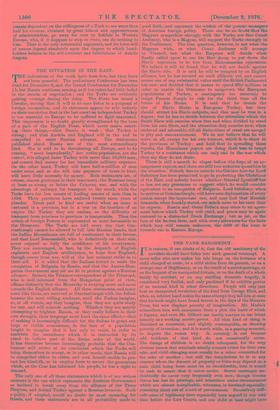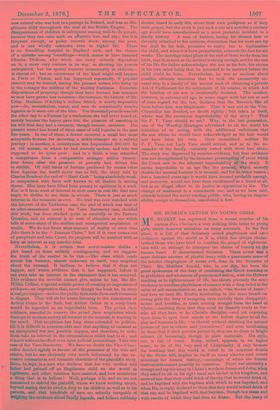THE VANE BARONETCY.
Iis curious, if one thinks of it, that the old machinery of the 1 novelists should have fallen into such general contempt. A story-teller who now makes his tale hinge on the fortunes of a child changed at nurse, or a child stolen from its parents, or on a strange case of illegitimacy, or on the result of a secret marriage, or on the bequest of an unexpected fortune, or on the death of a whole family by accident, or on any startling domestic tragedy, is considered very foolish, and only pardoned if he exhibits genius of an unusual kind in other directions. People will only just bear an unexpected revelation of the kind from George Eliot, and when an inferior hand makes the same attempt they tell him at once that his book might have found favour in the days of the Minerva Press, but now displays poverty of imagination. Mr. Mudie's subscribers turn with annoyance from a plot the basis of which is bigamy, and even Mr. Gilbert can hardly venture to use latent insanity as a working motive-power. All that kind of thing is dismissed as unnatural, and slightly contemptible, as showing poverty of invention ; and it is worth while, in a passing moment, to inquire the reason why. It certainly is not because odd incidents of that kind do not occasionally occur. The change of children is no doubt infrequent, for the very obvious reason that criminals usually commit crime for their own sake, and child-changing must usually be a crime committed for the sake of another ; but still the temptations to it in any country where the descent of property or titles may depend on a- male child being born must be so considerable, that it would, be rash to assert that it never occurs. Secret marriages un-
doubtedly do occur very frequently even now, though Gretns- Green has lost its privilege, and sometimes under circumstances' which are almost inexplicable, witnesses, in Scotland especially," remaining silent out of a sort of perverseness. Excessively dill.- cult cases of legitimacy have repeatedly been argued in our own time before the Law Courts, and one child at least might have now existed who was heir to a peerage in Ireland, and was an ille- gitimate child throughout the rest of the British Empire. The disappearance of children is infrequent among well-to-do people, because they can raise such an effective hue and cry ; but it is frequent enough, as police records show, among the poor, and is not wholly unknown even in higher life. There is no foundling hospital in England now, and the chance of a mistake among foundlings—which seems to have haunted Charles Dickens, who wrote one story entirely dependent on it, a story very curious in its way, as showing his powers unimpaired, but his special humour momentarily in oblivion— is almost nil ; but an occurrence of the kind might still happen in Paris or Vienna, and has happened repeatedly, if popular rumour may be trusted, among the peasant nurses who bring up in the cottages the children of the wealthy Parisians. Eccentric dispositions of property, though they have become less common as men have grown less eccentric—for instance, the history of Mr. Crisp, Madame D'Arblay's recluse friend, is nearly impossible now—do, nevertheless, occur, and men do occasionally receive legacies as it were out of the blue. Ten thousand pounds was left the other day to a Peeress by a tradesman she had never heard of, merely because the legacy gave him the pleasure of asserting in his will that they had a common, though remote, ancestor. The present writer has heard of three cases of odd legacies in the past five years. In one of them, a doctor received a small but most acceptable fortune for escorting a sickly stranger on a railway journey ; in another, a countryman was bequeathed £80,000 by an old woman, -to whom he had scarcely spoken, and who was supposed to be quite poor ; and in a third, a man inherited a competence from a comparative stranger within twenty- four hours after the pressure of poverty had driven him to suicide. Of odd turns of fortune produced by causes other than legacies the world never was so full, the story told by Charles Reade at the end of " Hard Cash " being absolutely weak, in comparison with facts well known to all dealers in mining shares. Men have been lifted from penury to opulence in a week. Nor is it from want of interest in such cases in real life that men begin to dislike to see them in novels. There is just as much interest in the romantic as ever. No trial was ever watched with the interest of the Tichborne case, the plot of which was that of an ultra-sensational novel ; the Vane Baronetcy case, decided this week, has been studied quite as carefully as the Eastern Question, and no rumour is so sure of attention as one which tells of some story of the sudden and unexpected acquisition of wealth. We do not know what amount of reality or even bona fides there is in the " Jennens Claim," but if it ever comes out of pamphlets and into Court, its progress will be watched with as keen an interest as any murder-trial.
Nevertheless, it is certain that novel-readers dislike a plot based on these unlikely contingencies, and we suppose the truth of the matter to be this :—The elms which reads novels has become, almost unknown to itself, very sceptical about the unusual. It inclines to believe that it does not happen, and wants evidence that it has happened, before it can even take an interest in the statement that it has occurred. This evidence the novelist cannot give, unless he has, like Mr. Wilkie Collins, a special artistic power of creating an impression of evidence—an impression that, novel though the book be, its story is realpro tempore--and so the public turn aside from such romances in disgust. They will sit for hours listening to the statements of Arthur Orton in the flesh, but Arthur Orton in a story-book would be regarded as an improbable bore. The prima fade evidence, essential to remove the prima facie scepticism which destroys in modern society all interest in the unusual, is wanting in the novel. This scepticism has long since extended to politics, till it is difficult to convince able men that anything so unusual as an unexpected war can possibly happen, and therefore, to make them take an interest in the circumstances which lead to it ; and it isnot withoutits effect even upon judicial proceedings. Take this case of the Vane Baronetcy. We have no doubt the Vice-Chan- cellor decided rightly in favour of the possessor of the title and estates, but he was obviously very much influenced by the ex- cessive unusualness and romantic character of the plaintiff's story. Here, he says, is a man who declares that his own mother. and father had palmed off an illegitimate child on the world as legitimate, and other relatives have assisted, and how monstrous a thing that is to believe ! Well, perhaps it is, and we are not concerned to defend the plaintiff, whom we know nothing about, beyond saying that he owed a duty to his children as well as to his parents, and that hundreds of men are actually incapable of weighing the evidence about family legends, and believe rubbishy stories, heard in early life, about their own pedigrees as if they were gospel, but the story is just such a one as a novelist a century ago would have manufactured as a most probable incident in a family history. A man of fashion, hating his distant heir or devoutly attached to his mistress, determines that his next son by her shall be his heir, promises to marry her to legitimatise the child, and when it is born prematurely, conceals the fact for six weeks. The marriage takes place at the end of three weeks from the birth, that is, as soon as the mother is strong enough, and for the rest of his life the father acknowledges the son as his heir, his excuse in his own mind being that he intended to be married before the child could be born. Nevertheless, he was so anxious about possible ultimate detection that he took the excessively un- usual step in a family of the second rank of obtaining a private Act of Parliament for the settlement of his estates, in which Act the heirship of his son is incidentally declared. The mother, however, in extreme old age, in some anger with her son or out of some regard for the law, declares that the Baronet, like all born before him, was illegitimate. That it was not so the Vice- Chancellor has decided, uo doubt rightly ; but taken in itself, where was the enormous improbability of the story ? That Sir F. F. Vane should so act ? Why, in the last generation, one of the Wortley-Montagus advertised to all the world his intention of so acting, with the additional unfairness that the son whom he would have acknowledged as his heir would not have been his own. Once committed, neither Sir F. F. Vane nor Lady Vane could retreat, and as to the re- mainder of the family, certainty rested with those two alone. The story was disproved by counter-evidence, but, that evidence was not strengthened by the immense presumptiOn of error which the Court saw in the inherent improbability 41the story. It seems improbable to an age like the present, which secretly doubts the unusual because it is unusual, and for no other reason ; but a hundred years ago it would have seemed probable enough, and moreover, would not have been condemned as a fraud at all, but as an illegal effort to do justice in opposition to law. The change of sentiment is a remarkable one, and as we have said, extends beyond the novel-reading public, who, having no respon- sibility except to themselves, manifested it first.



































 Previous page
Previous page